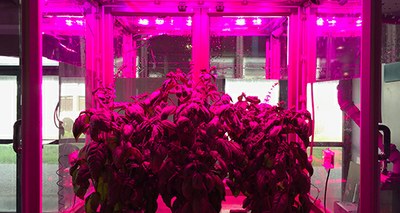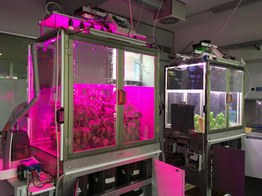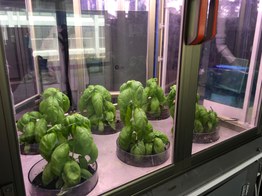Innovation: ENEA and FOS patent field simulator to grow plants indoor
4/6/2020
 Microcosmo, the field simulator conceived and developed by ENEA and FOS SpA, has been allocated funding from the Autonomous Province of Bolzano for a feasibility study to be conducted at the "NOI Techpark" research center in the South Tyrolean capital. Research will develop artificial intelligence applications both in the agronomic and entomology fields. Microcosm makes it possible to grow some plants like olive, potato, tomato, lettuce and basil indoors and in extreme environments, using soil.
Microcosmo, the field simulator conceived and developed by ENEA and FOS SpA, has been allocated funding from the Autonomous Province of Bolzano for a feasibility study to be conducted at the "NOI Techpark" research center in the South Tyrolean capital. Research will develop artificial intelligence applications both in the agronomic and entomology fields. Microcosm makes it possible to grow some plants like olive, potato, tomato, lettuce and basil indoors and in extreme environments, using soil.
 It’s an actual hi-tech simulator, unique in Italy, which makes it possible to grow plants -including woody ones- in environments usually unsuitable for cultivation, such as airports, subways and shopping malls, as well as in extreme environments such as desert and glacial areas or in space missions ”, Luigi d'Aquino, researcher at the ENEA Portici Center and inventor of Microcosm explained.
It’s an actual hi-tech simulator, unique in Italy, which makes it possible to grow plants -including woody ones- in environments usually unsuitable for cultivation, such as airports, subways and shopping malls, as well as in extreme environments such as desert and glacial areas or in space missions ”, Luigi d'Aquino, researcher at the ENEA Portici Center and inventor of Microcosm explained.
The simulator uses a hi-tech apparatus which manages plants growth with sensors monitoring parameters such as humidity and temperature, which influence development and reproduction, and LED lights that control illumination, selecting the wavelengths most useful for the growth of plants.
"Artificial intelligence, connected to the Internet of things, will enable the system to manage itself autonomously, making Microcosm a very precious tool for the agricultural sector, especially in this historical phase in which critical issues related to climate change and soil consumptin will have to be tackled, “ d'Aquino continued.
 The technology, patented by ENEA and the company FOS in Liguria, was designed within the Tripode public-private laboratory and further developed thanks to the project ISAAC, financed with over 4.7 million euro by the PON Imprese & Competitività 2014-2020 of the Ministry of Economic Development, which also includes the company Becar (Beghelli Group).
The technology, patented by ENEA and the company FOS in Liguria, was designed within the Tripode public-private laboratory and further developed thanks to the project ISAAC, financed with over 4.7 million euro by the PON Imprese & Competitività 2014-2020 of the Ministry of Economic Development, which also includes the company Becar (Beghelli Group).
"The outcomes of the long-lasting, fruitful collaboration between ENEA and the Group FOS is proof of the vital role research can play in supporting companies involved in processes they couldn’t carry through due to lack of funds and know-how, and also that it can have a positive impact on the national economic system for both applied research and industry ", d'Aquino concluded.
For more information please contact:
Luigi d’Aquino, ENEA - Bioproducts and Bioprocesses Laboratory, luigi.daquino@enea.it
